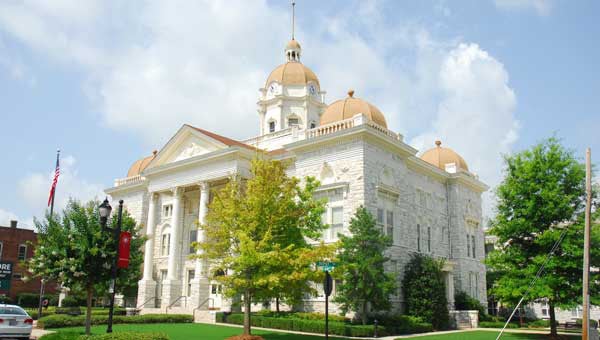UPDATED: Supreme Court rules in favor of Shelby County
Published 10:42 am Tuesday, June 25, 2013

The U.S. Supreme Court overturned a key section of the Voting Rights Act, ruling in favor of Shelby County in the Shelby v. Holder case. Pictured is the Shelby County Courthouse. (Photo by Jon Goering/For the Reporter.)
By AMY JONES / Associate Editor
In a landmark decision on June 25, the U.S. Supreme Court overturned a key section of the Voting Rights Act, ruling in favor of Shelby County in the Shelby v. Holder case.
In the case, argued on Feb. 27 of this year, Shelby County challenged two sections, 4 and 5, of the Voting Rights Act.
The Supreme Court decision overturns Section 4, which defines the “covered jurisdictions,” which include Shelby County and cities in 16 other states with histories of racial discrimination.
Section 5 requires those jurisdictions to obtain preclearance from the Department of Justice before making any changes to voting procedure or electoral maps.
According to the decision, the court held that Section 4 of the Voting Rights Act, passed in 1965, is unconstitutional “in light of current conditions.” The section has been reauthorized several times since its passage, most recently in 2006.
“Nearly 50 years later, things have changed dramatically. Shelby County contends that the preclearance requirement … is now unconstitutional. Its arguments have a good deal of force,” the decision states. “In the covered jurisdictions, ‘voter turnout and registration rates now approach parity. Blatantly discriminatory evasions of federal decrees are rare. And minority candidates hold office at unprecedented levels.’”
The court did not invalidate Section 5, but said Congress would have to find an up-to-date way to decide who should have to obtain preclearance if the section is to remain in effect.
“Our country has changed, and while any racial discrimination in voting is too much, Congress must ensure that the legislation it passes to remedy that problem speaks to current conditions,” the opinion states.
Chief Justice John Roberts wrote the majority opinion. He was joined in his opinion by justices Antonin Scalia, Anthony Kennedy, Clarence Thomas and Samuel Alito. Ruth Bader Ginsburg, Stephen Breyer, Elena Kagan and Sonia Sotomayor dissented.
Shelby County Attorney Butch Ellis said he was pleased with the ruling.
“I’m elated that the court recognized that we are a dynamic, changing county, that the last 50 years have brought about changes that no longer justify the intense scrutiny of the federal government of everything we do,” he said.
Ellis also said the county’s legal team expected the court to overturn Section 4 of the Voting Rights Act, which he said was “not constitutional.” He also said the county supports the Voting Rights Act and that Sections 4 and 5 were meant to be temporary measures.
“Section 2, which was always intended to be the permanent provision of the Voting Rights Act, will be there to protect against discrimination,” he said.
Shelby County Manager Alex Dudchock said he felt Shelby County had a “strong” position from the beginning of the lawsuit.
“I felt like we had a very good position because of the clear advancement our county and other counties had in ensuring voting practices in all other forms of local governments, in being reasonable and respectful for all people and in the resulting actions clearly not indicating any discriminatory practices,” he said.
“Even me as a layperson, I felt like I was given the indication that our position was strong, and that the section should not have been continued for all these years, and that they should have gone ahead and amended that and removed what we thought was unconstitutional. And that’s what happened,” he added.
Pastor Kenneth Dukes, a Montevallo resident who helped organize a June 22 rally in support of Sections 4 and 5 of the Voting Rights Act, said he was disappointed in the decision.
“I’m disappointed that we have to face this situation,” he said. “It kind of frightens you to see what’s next.”
Dukes said there are still plans to organize a county chapter of the NAACP, and he hopes the county will work with the group when making changes to voting practices.
“Shelby County seems to have good people,” he said. “I hope that we will come together and work as a team.”
He also said if the NAACP sees discriminatory voting practices, it will pursue all legal avenues.
Managing Editor Katie McDowell also contributed to this report.









